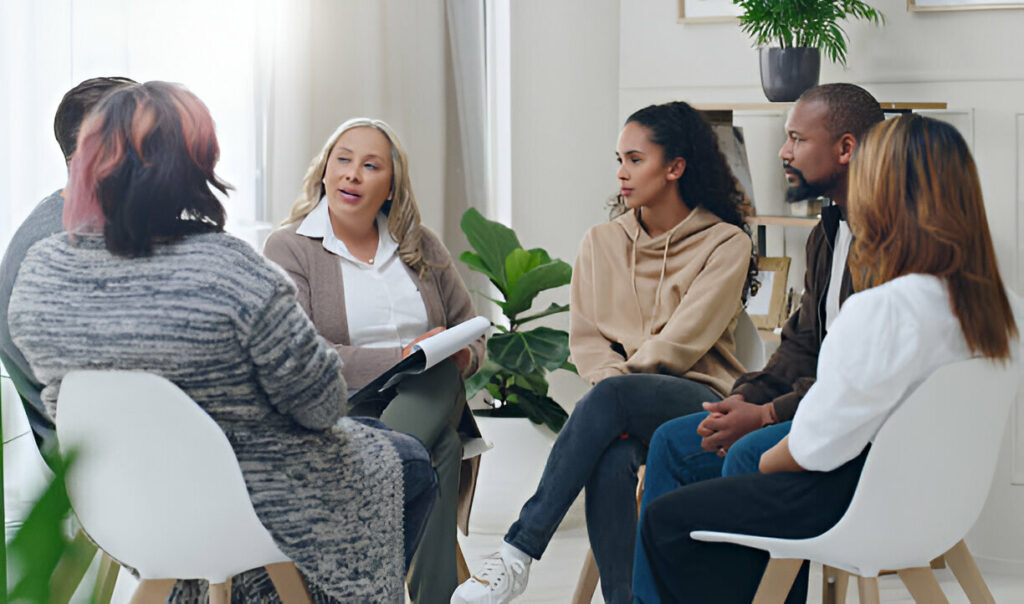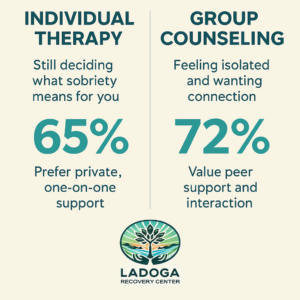You might not identify as someone with a substance use disorder. Maybe you’re just starting to wonder: Would life feel better without the drinking? Could I use some support—even if things aren’t “bad”?
At Ladoga Recovery Center in Indiana, we work with a wide range of people exploring addiction therapy. Some have already decided to get sober. Others are simply curious. Wherever you land, one of the most common early questions is: Should I start with therapy or try group counseling?
Here’s the good news: You don’t need all the answers before you begin. But understanding the core differences can help you feel more confident—and more at ease—about the path ahead.
What Is Individual Therapy?
Individual therapy is a private, one-on-one conversation between you and a licensed therapist. It’s your space. Your pace. No filters required.
In these sessions, you might explore:
- Patterns you’re noticing in your substance use
- The emotional or social reasons behind drinking or drug use
- Past experiences that still affect your choices today
- Anxiety, depression, or other mental health symptoms
- Personal goals for change—even if they’re still forming
This type of therapy offers structure and safety. You don’t have to worry about others listening in or holding back out of shame. For many people taking early steps in recovery, this privacy is crucial.
You might spend the first few sessions simply talking things through—no labels, no ultimatums. That alone can be life-changing.
What Happens in Group Counseling?
Group counseling brings together 6–12 people (usually) with shared struggles or goals. At Ladoga Recovery, that might mean a group focused on early sobriety, grief and substance use, or rebuilding relationships in recovery.
Led by a trained therapist, these sessions create a space to:
- Hear others’ stories and realize you’re not alone
- Practice vulnerability and emotional honesty
- Receive support, feedback, and insight from peers
- Build communication and coping skills in real time
It’s natural to feel nervous about opening up in a group. Many of our clients start out skeptical—and end up surprised by how much they gain. Just hearing someone else describe what you’ve been silently feeling can be a turning point.
Group counseling is also structured. You won’t be left guessing what to share. Skilled facilitators create a rhythm and guide each session to ensure safety, respect, and space for everyone.
Therapy vs. Group Counseling: Side-by-Side Breakdown
To help you visualize the difference, here’s a quick comparison:
| Feature | Individual Therapy | Group Counseling |
|---|---|---|
| Privacy | 100% confidential; just you + therapist | Shared space with peer support |
| Focus | Deep dive into your personal history, emotions, and goals | Shared discussion topics and themes |
| Cost | Typically higher per session | More affordable option |
| Pacing | Flexible; tailored to your needs | Follows a group schedule and flow |
| Connection | Builds deep trust with one provider | Encourages bonding, feedback, belonging |
| Accountability | Internal—through personal goals | Collective—via group consistency |
There’s no universal “better” option. It depends on your emotional comfort, budget, support needs, and where you are in your recovery process.
How to Know What’s Right for You
You might lean toward individual therapy if:
- You’re still deciding what sobriety means for you
- You have past trauma, grief, or mental health concerns you’ve never talked about
- You’re more comfortable opening up in private
- You want full control over the pace and focus of your healing
You might prefer group counseling if:
- You’re feeling isolated and want connection
- You learn best through shared experience and interaction
- You’re looking for motivation or accountability
- You want a lower-cost or flexible starting point
Still torn? That’s okay. It’s common to try one format, then add or switch as your confidence grows.
At Ladoga Recovery, we often recommend combining both approaches. Many of our clients start with one-on-one sessions and later join a group—or use group sessions to stay supported between individual therapy appointments.
Why Ladoga Recovery Offers Both
Addiction therapy isn’t one-size-fits-all. That’s why our Addiction Therapy Programs in Indiana are built to reflect the unique needs of each person who walks through our doors.
Some clients need a quiet place to unpack complex emotions. Others thrive in the energy and honesty of a group. Many move fluidly between both spaces as their needs shift over time.
We don’t expect you to come in knowing exactly what you want. In fact, part of our role is helping you figure that out—through compassionate listening, thoughtful assessment, and co-created care plans that evolve with you.
What you won’t find here is pressure, shame, or pre-set paths. Our goal is simple: help you move toward clarity, stability, and the version of your life that feels right to you.
FAQs About Addiction Therapy and Group Counseling
Do I have to choose just one—therapy or group?
Not at all. Many people use both. You might begin with therapy to get grounded, then add a group later—or vice versa.
Will people judge me in a group setting?
Most clients are surprised by how safe and respectful group counseling feels. Everyone is there for similar reasons. What starts out feeling vulnerable often becomes deeply affirming.
What if I’m not sure I need “addiction therapy”?
You don’t need to claim any labels to explore support. If substances are taking more than they’re giving—or you’re just feeling off—therapy can help you make sense of it, your way.
Is therapy confidential?
Yes. Individual sessions are completely private, and your information stays between you and your therapist.
Can I start without committing long-term?
Absolutely. We work with people at all stages of readiness. Even one session can help clarify what’s next.
Ready to Take the First Step?
Curious about where to begin? We’re here for that. At Ladoga Recovery, you don’t need to have it all figured out. Whether you’re drawn to therapy, group counseling, or just want to ask a few questions, our Indiana team is ready to support you.
Call us at (844) 628-6202 or Contact Us. No pressure—just real people, ready to help.


